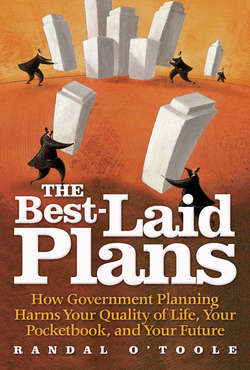Читать книгу The Best-Laid Plans - Randal O'Toole - Страница 18
На сайте Литреса книга снята с продажи.
6. Radical Doctrine or Rational Decisionmaking?
ОглавлениеImagine a world free of politics. Imagine everyone has the best of intentions. Imagine the sharpest experts are at your disposal. Is it possible to plan? That is, is it possible for a government agency employing those experts to write a long-term, comprehensive land-use plan for your city, region, watershed, or other large area of land?
Many believe the answer is yes. “Planning is not radical doctrine,” say planners. It is rational decision making. It is time the country gives up its fear of planning and embraces its benefits.”1 Yet there is little evidence in history that government-controlled, centralized planning can work. The Soviet Union failed spectacularly not because it was communist, in the sense of common ownership of the means of production, but because the government had turned over all production questions to planners. Yet the above defense of planning was written less than five years after the collapse of the Soviet Union.
There are several technical barriers to the success of planning. These barriers prevented planning from working in the Soviet Union, and they are just as much of a problem for American planners.
• The Data Problem: Planning requires more data than can be collected in time for it to be useful to planners;
• The Forecasting Problem: Planners cannot predict the future;
• The Modeling Problem: Models complicated enough to be useful for planning are too complicated for anyone to understand; and
• The Pace of Change Problem: Reality changes faster than planners can plan.
